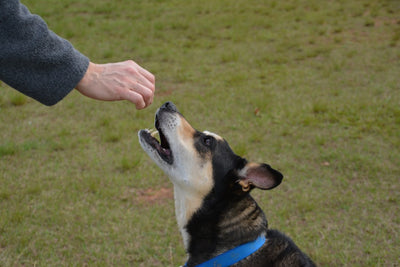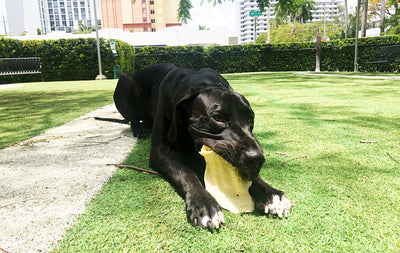Protein is an essential part of your dog's diet.
Protein makes and maintains all healthy tissue and molecules in your pet's body, which include muscle, skin, hair, antibodies, and hormones, explains Jennifer Coates, DVM, a veterinary consultant in Fort Collins, Colorado.
All dogs' have different dietary needs. Because of this, you must consult with your veterinary for your dog's specific needs. According to Dr. Coates, three types of dogs typically benefit from a high-protein diet: highly-active dogs, puppies, and seniors.
1.Highly Active Dogs
A highly active dog such as a K9, service dog, or any highly active breed, benefit from high-protein dog food and our organic protein-based dog treats. It can help "build the necessary muscles and repair them after an intense workout," says Dr. Coates, author of "Dictionary of Veterinary Terms: Vet-Speak Deciphered for the Non-Veterinarian." Higher protein levels work as sources of energy for active dogs. "Once all of a dog's protein needs are met, excess protein gets converted into energy," Dr. Coates adds. However, if your dog isn't exercising daily, Dr. Coates warns that those extra calories from protein can get converted into fat.
2.Growing Puppies
A puppies' growth and development depend on many multiple factors, adequate-protein levels being one of them, Dr. Coates says. The reason is simple: Muscles need protein to grow, and puppy muscles have a lot of growing to do. Another reason why higher levels of protein might contribute to normal puppy growth is that, as Dr. Coates already pointed out, protein is imperative to more than just muscle growth. Protein is a vital component in supporting normal immune system function as well as healthy skin and coat. High-protein dog food is also necessary for pregnant or lactating dogs.
3.Senior Dogs
A high protein diet is healthy for older dogs, as well. It can benefit senior dogs because they can experience muscle deterioration, which means they lose muscle mass with aging, Dr. Coats explains. The weakened muscle makes it harder for older dogs to stay active and healthy since muscle power activity and play. While protein is essential for muscle growth, it is also needed to maintain muscles, Dr. Coates says. For these reasons, she promotes senior dog owners to consider high-protein dog food to keep pets at their best during their golden years.
However, there are some crucial exceptions, Dr. Coates says dogs diagnosed with kidney or liver disorders should avoid high-protein dog food because higher protein levels might exacerbate these conditions. If you might have any doubts, it is best to check with your veterinarian and see if your senior dog is a good candidate for a high-protein diet.
Remember always to consult a veterinarian to check if a high protein diet is safe for your pet. For additional tips on pet care register to our mailing list today.






